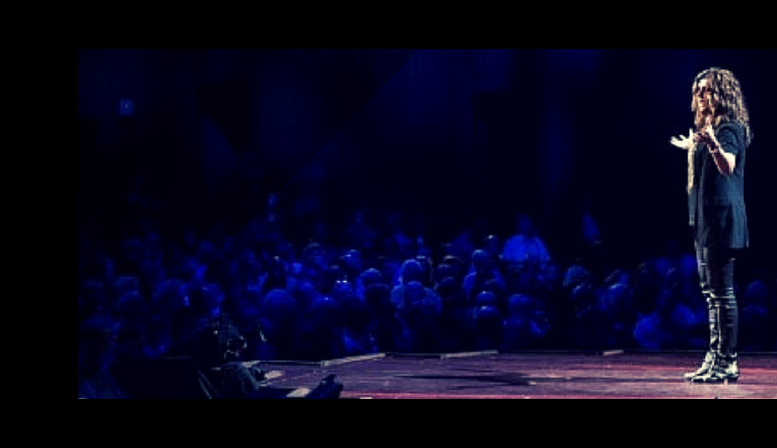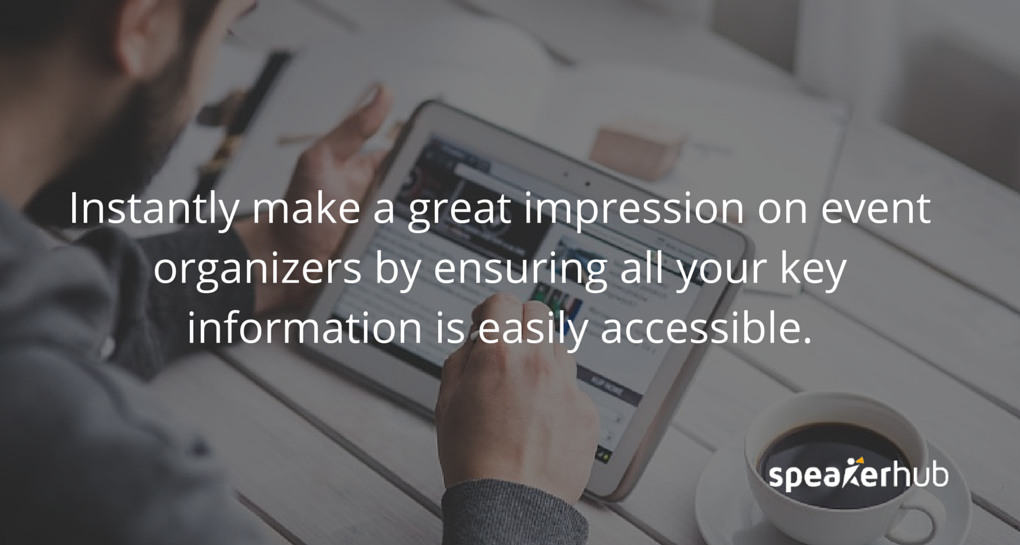How to Create an Effective SpeakerHub Profile

Your profile is the gateway to attracting new speaking opportunities, it is important to remember who your targeted audience is. What kind of event organizers do you want to view your page? What do you want them to take away about you, and your expertise?
Include your relevant experience in an engaging way. Openly express what you are passionate about, and showcase your skills by uploading videos and slides from your presentations. Use your profile to give the organizer a clear indication that you are the right speaker for their event.
Here are a few tips on how to make your profile powerful:
1. Choose the right profile photo.
The majority of event organizers will not click on a profile that is without a photo, so always make sure to add a headshot.
Choose a photo that:
-
Has been taken within the past two years: we all want to be our best self, but a picture that depicts you accurately will ensure your credibility in the long run.
-
Is high quality with a simple background: Your profile photo doesn’t necessarily have to be from a professional photo shoot, but uploading a clean, sharp image will make a good impression. Don’t let the background be distracting, keep it clear and the focus on your face. Make sure your headshot is in focus, with good lighting.
-
Shows your face: your face should take up at least 50% of the photo. Although the fact that you hiked up to the top of Kilimanjaro is pretty inspirational: it doesn’t really help the event organizer see what you look like.

2. What makes you special: creating a great headline.
Your headline is essential for leading the event organizer into the rest of your profile. Keep in mind that:
-
Your headline is what gets event organizers to click on your profile: the short description will appear in all search listings with your photo, so make sure that it is compelling.
-
Only list your most relevant job title and organisation. Don’t list any irrelevant past companies that have nothing to do with the topics you speak about or train in, just highlight your subject matter expertise.
-
Talk directly to your audience and highlight your specialities. Create a headline that is unique and original, and that will make the event organizer think (for instance, “Chief evangelist of healthy eating for children” or “Failed to launch 8 companies, succeeded in making 1 a mega-success”.)
To make your profile more searchable, always include important keywords, but avoid diving too deep into industry specific jargon.

3. Highlight your expertise in your bio.
The bio is one of the most important sections on your SpeakerHub profile, because it is the first thing the event organizer will read after they’ve decided to click on your photo and headline. Make it robust, to the point, and personal.
Sometimes less is more: event organizers are busy people.
Make the information easily accessible: the event organizer is going to click, speed read and move on. Be considerate of the organizer’s time, imagine they have 20 seconds to read your bio: what do you want them to take away?
How to write an effective bio:
- Be clear: Think about what you want the organizer to remember about you after they’ve read it. Have a narrative and stick to it. Are you an activist, an academic, an entrepreneur, or an artist? Keep it simple and be clear about your positioning.
- Be personable and speak in first person: Don’t be afraid to show off your personality. Are you funny? Are you very direct? Let your summary reflect this. Try to imagine you're having a conversation with someone and write accordingly. Keep it engaging and to the point. Speaking in third person can make you seem out of touch and impersonal.
- Pay attention to the layout: make sure to break the text into paragraphs, bullet points and easy-to-read sections. Event organizers will most likely just scan the text. Make the relevant information crystal clear.
- Be specific: there is a big difference between giving a presentation to a “large audience” or saying that you spoke to “750 senior-level delegates at their executive retreat”. Include figures, numbers, the level of seniority of your audience and any other information that makes your expertise more concrete.
- Keep it current and accurate: Don’t copy and paste sections of your old resume or CV, fill this section in with what you have been doing lately, and what you'd like to be doing. Always stick to what you can actually deliver. False statements and representations can lead to disappointment from the organizer, and may even raise future legal issues.

4. Building your showcase: experience and expertise
Showcasing your speaking talent is the very best way that people will know if you are the right fit for their event. On SpeakerHub, you can showcase a wide variety of content: from articles you’ve written, to videos of your presentations.
When choosing which content to showcase, make sure you keep in mind what kind of opportunities you are looking for ( from topics to event types such as conferences, dinner speeches, workshops, school speeches.) Keep the content relevant to this.
Types of media to showcase:
- Include videos. compared to other content formats, video is best for showing event organizers exactly what your stage presence looks like. Top tip: upload testimonials from event organizers and attendees.
You can upload up to 5 pieces of media for free, if you would like to upload more than this, you can easily upgrade to a Silver or Gold account (find out more here.) - Presentation Slides (via Slideshare or Scribd) and Prezis. To increase the visibility of your presentations, don’t let them die after you've delivered them. Upload your presentations to SlideShare, and add the links to your profile to showcase them.
- Show your expertise with podcasts, articles, and books. It is one thing to say you are an expert, but it is another thing to showcase it. By sharing links to podcasts and articles you've produced or been featured in, or books you've written (or co-written,) you solidify that you are an expert on your topic.
5. Increase your credibility with testimonials
Including testimonials from the people you’ve worked for and with will increase the event organizers' confidence that you are able to present compellingly. A top tip is to ask the event organizer immediately after the event.
Here is an example of a clear, credible testimonial.
"Enthralling and entertaining, you deliver a powerful message that motivates and lifts the audience. Your message about winning on the court and in life, captivated our audience. Again and again, the 550 guests at our annual meeting commented, "He was awesome."
-Charlotte K., President of the Marietta Area Chamber of Commerce
Effective testimonials:
-
have clearly stated outcomes. They talk about the effect of working together, or the impact the talk had on the audience. The event organizer knows what they can expect by working with you.
-
are easy to read. They hit the sweet spot in word count at roughly 40-50 words. Testimonials that are too short (for example, “He was great, we’d be happy to have him back,”) don’t have enough weight to make them credible, whereas testimonials that are too long will most likely be passed over by the reader.
-
are from the right person: When a testimonial is given by someone who is high ranking in the organization, it gives extra credibility to the speaker.

6. Connect, share, and update your profile.
Once you linked up your own social media pages and websites, make sure that your other profiles will solidify that you are the right person for the organization to work with. Only link the sites that will reinforce your professionalism and expertise.
Optimization isn’t just about filling all details on your profile; it’s also about being an active SpeakerHub user by keeping your page up to date with your current material, and the most recent events you’ve presented at.
Share your SpeakerHub profile. When you are networking, you can direct people to your speaker profile to showcase the work you do as a speaker.

Your SpeakerHub profile is a way to market yourself to event organizers. Make sure your profile stands out to event organizers by keeping is up to date with diverse, relevant content.
Have we missed any tips that you would include on the list? We’d love to read your recommendation, please send us an email.






